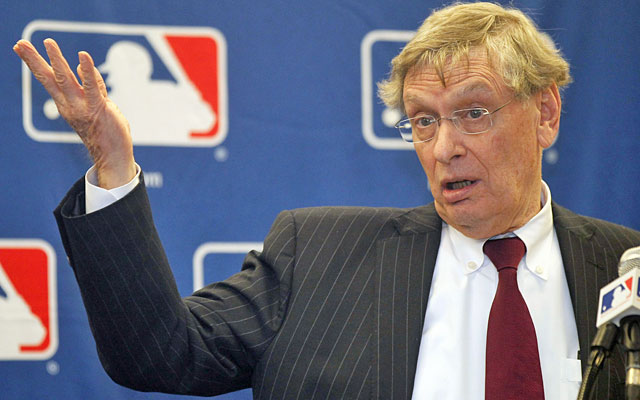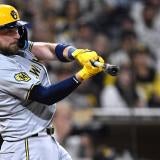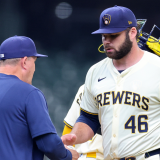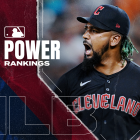 |
| Bud Selig has not been formally presented with the Marlins-Blue Jays trade, but he is reviewing the move. (AP) |
CHICAGO -- Major League Baseball commissioner Bud Selig is said to be "not happy" about the monster trade that has been characterized as a $166 million Marlins fire sale to Toronto. However, so far Selig also is not inclined to disallow the deal that sent stars Jose Reyes, Mark Buehrle, Josh Johnson and two other veterans to Toronto for seven players, all but one of them prospects or very young players.
Officially, Selig said several times that the trade is "under review."
Technically, the monster deal had not even been officially consummated when Selig spoke, as the two teams involved in the trade that rocked baseball on the eve of the owners' meetings here were awaiting physicals and paperwork, but Selig was peppered with questions about the trade at the close of the owners' meetings.
The deal baseball is buzzing about will send catcher John Buck and utilityman Emilio Bonifacio to Toronto with the three stars for for left-handed pitcher Justin Nicolino, outfielder Jake Marisnick, shortstops Adeiny Hechavarria and Yunel Escobar, right-handed pitchers Henderson Alvarez and Anthony DeScalfani and catcher Jeff Mathis.
| More on Miami Marlins |
| Column |
 |
| Related links |
Blue Jays president Paul Beeston said, "It's exciting," before reserving further comment until the trade is official.
Not everyone in baseball is quite so thrilled.
Selig admitted he was up at 3 a.m. the night before weighing all the possible cons regarding the trade he understood is being lampooned in South Florida (one radio voice joked that maybe the Marlins would have Fidel Castro throw out the first pitch next season).
"I'm very protective of this sport. I worry about it, and I'm sensitive to it," Selig said.
But as of yet, word is that Selig is still searching for ample reason to overturn the trade. He as much hinted he's likely to approve the deal (albeit begrudgingly, according to those close to him) when he said, "In a trade for cash, that's a different story. Other than that, clubs have to make their decisions."
There isn't much, if any, precedent, for trades to be blocked on the grounds of the "best interests of baseball" clause, though ex-commissioner Bowie Kuhn once blocked sales of star players like Joe Rudi and Rollie Fingers by A's owner Charlie Finley. In this case, the money (said to be about $8 million) is actually going from the Marlins to the buying Blue Jays.
The Marlins are also saving about $166 million, no small sum, by shedding contracts. However, in an exclusive interview with CBSSports.com, Marlins owner Jeffrey Loria painted the blockbuster -- which comes after the team's first year in the largely publicly funded Marlins Park -- as their way to get better.
"We finished in last place. You figure it out," Loria said.
A few other owners were scratching their heads. One National League owner said, "The question is faith. Will they ever get back the fans' faith?"
Some owners were sympathetic to what lies ahead for Loria, though. "He's going to get killed down there," one NL owner said.
Most owners reserved judgment. Brewers owner Mark Attanasio, who pulled up a small-market franchise in Milwaukee, said, "Everybody's got to do their own thing. There are a lot of factors unique to each team. You can't possibly know unless you're living it yourself."
Yankees president Randy Levine, whose team hasn't always been happy when small-market teams pocketed revenue-sharing monies the Yankees contributed, resisted any temptation to pile on. Levine said, "There's a collective bargaining agreement. As far as I understand, everyone's following the rules. Teams are allowed to do what they want to do."
Selig said he heard from two baseball people who said the Marlins actually did very well from a baseball standpoint. Scouts like Marisnick, Nicolino and Hechavarria, in particular -- though Toronto held onto its best young players who are currently in the major leagues, third baseman Brett Lawrie, outfielder Anthony Gose and catcher J.P. Arrencibia.
The loss of Reyes was the one Loria wasn't thrilled about. "Wonderful guy," Loria called him. "What's not to love?"
Understandably, questions about the Marlins' finances are coming up now. The Marlins fell way below their revenue projections in their very disappointing season, and one person with knowledge of their finances suggested they are "under water," which may have necessitated this drastic measure.
The question has arisen in private conversations with other owners as to whether the Marlins' debt is such that it may force them to sell the team. But Loria said, "Absolutely not."
Loria maintained the sole motivation is improvement after the team's stunningly bad 69-93 season. "We have to get better. ... We have to take a new course," he said.
MLB has weathered some difficult situations in recent seasons, and Selig pointed out they wound up with very positive results with the Texas Rangers and Los Angeles Dodgers, who were eventually sold by bankrupt owners to well-healed folks.
The Mets' owners, the Wilpons, seem to have come through tough times after winning the case against Madoff trustee Irving Picard, paying back loans from MLB and taking on a few new limited partners, though the Mets are still not operating quite like a big-market team in terms of player procurement.
The Marlins' trade wasn't discussed in the full group meeting, according to people in the room, when the bulk of the time was spent approving and celebrating the $12.4 billion in national TV contracts, and other issues.
One unnamed management person told the New York Post that Loria ate alone in the lunch room Wednesday, and didn't converse with other owners. He did dine with other owners at breakfast on Thursday. However, he requested and received an escort to accompany him to breakfast.

















